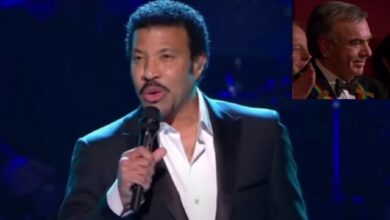Eddy Arnold And LeAnn Rimes Presented A Remarkable Yodeling Showdown In Their “Cattle Call” Performance
“Cattle Call,” an iconic classic in the realm of country music, traces its origins to 1944 when it was first recorded by legendary singer Eddy Arnold. This song is celebrated for its distinctive Western swing style, which marries elements of jazz, swing, and traditional country. A defining aspect of “Cattle Call” is the use of a cowboy’s “cattle call” yodel, a technique that Arnold not only mastered but also showcased excellently in this piece. His smooth vocal style combined with his impressive yodeling abilities set a standard for country music that persists to this day.
Arnold’s version of “Cattle Call” achieved remarkable success, capturing the top spot on the Billboard Juke Box Folk Records chart in 1945. This achievement underscored his knack for harmonizing traditional country sounds with innovative musical touches. The song’s lyrics vividly depict a cowboy’s life, highlighting his deep connection with his cattle. Arnold’s charismatic delivery, coupled with the authenticity of his performance, made “Cattle Call” not just a song but a storytelling experience. The catchy refrain, accentuated by his unique yodel, further cemented the track’s status in the annals of country music.
As a part of the 1940s musical landscape, “Cattle Call” reflects the emerging Western swing genre that was characteristic of that era. This style was a lively blend of traditional country with jazz influences, evident in the rhythmic structures and instrumental arrangements. Arnold’s smooth vocal delivery, combined with the engaging yodeling, created a sound that was inviting and reflective of the cowboy lifestyle. The emotional expressiveness in his voice allowed listeners to resonate with the song’s themes, providing a glimpse into the bond between cowboys and their herds, which is deeply ingrained in American folklore.
The impact of “Cattle Call” extends well beyond Arnold’s original recording. The song has been covered by a myriad of artists, each bringing their unique flair and interpretation to the classic. One notable rendition came from Elvis Presley, who included his version of “Cattle Call” on his 1969 album “From Elvis in Memphis.” This cover introduced the song to a fresh audience, showcasing Presley’s versatility and his respect for country music’s roots. His take on “Cattle Call” not only revitalized interest in the piece but also bridged the gap between different musical generations.
“Cattle Call” has become an enduring staple in the repertoire of country music. It is frequently performed in live concerts, celebrated not only for its catchy melody but also for the sentimental feelings it evokes. The song’s ability to conjure images of the American West and its pastoral life speaks to the timeless nature of its theme. Many artists across various genres have turned to “Cattle Call,” illustrating its cultural significance and the nostalgia it inspires within audiences.
Eddy Arnold, often referred to as the “Tennessee Plowboy,” played a pivotal role in the evolution of country music. His contributions stretched far beyond “Cattle Call,” as his career was marked by numerous hits that blended smooth vocals with engaging storytelling. Arnold’s influence can be seen in how he helped shape the sound of mid-20th-century country music, paving the way for other artists who followed in his footsteps.
The legacy of “Cattle Call” reflects both Arnold’s artistry and the broader American fascination with the cowboy lifestyle. The archetype of the cowboy—often depicted as rugged, yet deeply connected to nature—resonates with many aspects of American identity. As country music continues to evolve, “Cattle Call” stands as a steadfast reminder of the genre’s rich history and its ability to encapsulate the essence of American life through lyrical storytelling.
The song serves not only as a musical expression but also as a cultural artifact that represents the evolving narrative of the Western life. Each performance of “Cattle Call,” whether by Arnold himself or by those who followed, adds a layer to its history, ensuring that its spirit endures. The ongoing appeal of this classic underscores the timelessness of its themes and the continued relevance of the cowboy experience in contemporary society.
Overall, “Cattle Call” endures due to its combination of melodic charm, evocative lyrics, and the iconic performances that have brought it to life over the decades. The song’s history parallels the evolution of country music as a whole, making it a vital piece in understanding the genre’s legacy. It invites listeners to reflect on the past while celebrating the artistry that continues to thrive within the realm of country music.





